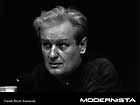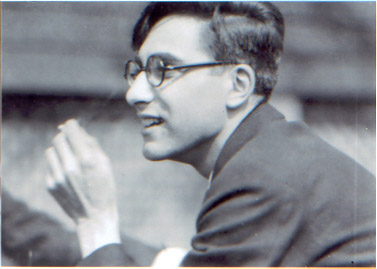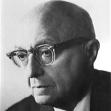French Poetry since 1950:
Tendencies III
by Jean-Michel MAULPOIX
- Translated from the original French by Catherine
Wieder.
1970 :
Settling, becoming disillusioned …
In the course of the seventies, a new generation of poets appears which manifests a concern for a very pronounced formalistic rigour, aiming this time at literariness. Emmanuel Hocquard, Claude Royet-Journoud, Anne-Marie Albiach, Alain Veinstein, Jean Daive were born in the forties. Directly marked by the disaster of humanism which went together with the second world conflict, the latter poets radicalized the trial against lyricism. They insist that most values or truths coveted by writing are from now on out of reach and that any attempt to grasp the being is as such doomed to failure. They are aware that poetry is, when all is said, nothing but a universe of enactments. They object to all kind of transcendence and question both the subjective discourse and the myth of depth. For them, there is nothing underneath words : neither truth or a hidden divinity. Manifesting the desire to break up from European lyricism, they « freeze » the notion of « speech ». Like Jacques Derrida, they attack the former phonocentrism of the « Dict », of « Dictung », of the saying. Their ultimate desire would be to reach a cold writing, both dull and muffled which would put poetry in a state of hibernation and would fix it as a pure work-upon-language.
Claude Royet-Journoud clearly summarizes this bias with a single phrase : « I find it far more more moving to say 'this arm is made of flesh' rather than to say 'the earth is blue like an orange'». The metaphorical is thus refused to the benefit of the literal. The poet manifests the desire for a flat language which is satisfied with observing that which takes place or that which remains. For example, on page 70 of Claude Royet-Journoud's book entitled « Objects contain the infinite », we read : « On December 24th and 25th, he meticulously described his desk ».
The desk whereupon the author writes indeed becomes one of the recurrent motifs of
writing. For Anne-Marie Albiach, poetry is « a practical
task, since one has to know how ». Writing is trying to find out more about the essence of
writing. The latter is felt as a defeat of the self, an experience whose terms and stakes are being
eschewed. Hence a multiplication of caesuraes within a poetics of broken speech and impossible articulation. Any musical search for alliterations or assonances is
challenged. Claude Royet-Journoud privileges a minimalism that is
a-narrative, a-musical and sometimes he even goes so far as placing only very few
words, nay just a few syllables upon a blank page :
« he will conceal
the return of the preposition
in front of the figure
the seizure of the neutral
when the body is a sentence to come »
Here it is the very figure of the poet himself which finds itself totally wiped out, or, rather, entirely suspended on the sole gesture of writing : a hand that « moves across » and the « seizure of the neutral », a slow elaboration through writing of a kind of « black body » in which the subject will come to shelter his
name.
¨ In order to characterize such a posture, Emmanuel Hocquard speaks of a « negative modernity ». For
him, it means pursuing the adventure of modernity, but in defining poetry this time by a series of
eliminations. He believes poetic writing to be conceived in terms of a « logical concrete knowledge ». The task of the poet becomes an activity of « cleansing » his own language and « elucidating » his
thought. He intends to clean language « out of its clichés, its
stereotypes, and its over-obliging flaws and approximate formulations ». He tries to reach « a literality as radical as possible ». Influenced by Wittgenstein's philosophical thought and by American objectivist poets
(Reznikoff, Oppen), he practices a writing that one might call a minimalistic one. If he entitles one of his most recent collections « Elegies », it is a matter of a neutral
elegy, wherefrom all directly-expressed feeling is
banished.
In his poetical short stories, Emmanuel Hocquard develops a tabular writing, very much like photography, from which all metaphorical paraphernalia or pseudo-depth is excluded and which, nonetheless, asserts itself, upon the eye, the ear and the very sensitiveness as being « poetical », as a consequence of its arrangement, its grammar and its focus :
« The wind, when it flattens the grass under the wind, when it sparkles underneath in a dull light, the scarecrow is in the middle of the song. Both vertical and hollow on the earth, it pertains some of the air. It becomes that figure of the wind in the italicized fall of borrowed clothes collapsing into pieces. It bends right in the middle of what remains standing. Trees, a wall. He, a dug, a hollow idea, fright crossing through it.
Long ago, I was forbidden to have a slanting hand-writing. Hence why my body may have been tilting instead of my writing; hence why I remained bent amidst what stands erect, i.e. the letters of a Roman alphabet.
It is windy. The old grammar says that the wind is the real
subject.
« He », the apparent
subject. »
The poem or the narrative here become but an opportunity to ponder upon writing and language. The image is summoned by the poet only in order to question its own figure. Far from letting himself go to its lure, he uses it as an instrument. As Françoise Laroque wrote in Critique, « Emmanuel Hocquard's originality is to be able to choose in place of the abstract the empty representation in which the images, deprived of a centre and of a referee, remain images through the delineation of outlines in which the sole narrative, i.e. the book's, comes from the cancellation of other narratives, and all the same keeps its narrative
tone. »
Such authors as Olivier Cadot (born in 1956) and Pierre Alferi will follow along a more play attitude, a path opened by Emmanuel Hocquard, Anne-Marie Albiach and Claude
Royet-Journoud.
 Next page : 1980, articulating
Next page : 1980, articulating










